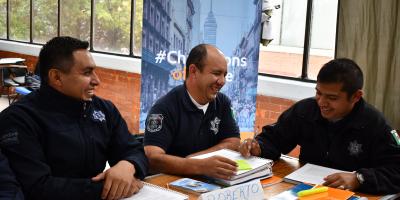
Languages: English | Español
The State of Mexico is replicating IDLO’s training course for first responder police officers, with 48 of the 377 state officers who graduated from the course now themselves conducting training in their police academies.
IDLO has been delivering training in Mexico since February 2019 to strengthen the skills and knowledge of police to improve their performance and ensure compliance with criminal procedures. By building their capacity, IDLO is enabling police forces to conform with regulations of the accusatory penal system, which places greater responsibility on the role of the police. IDLO’s courses are recognized as part of the official police training program and endorsed by the Government of Mexico.
The State of Mexico was the first federal entity where IDLO started implementing the project. So far, almost 1,200 police officers have been trained at the state and municipal levels across eight States: Chiapas, Guerrero, Hidalgo, Morelos, Oaxaca, State of Mexico, Tabasco and Tlaxcala.
Over the course of its four-year program, IDLO plans to extend the training to over 7,000 police officers across the country. For the long-term success and sustainability of the program, local ownership such as that demonstrated in the State of Mexico is crucial.
For the long-term success and sustainability of the program, local ownership such as that demonstrated in the State of Mexico is crucial.
“The State of Mexico is one of the states with the biggest police force in the country. It is impossible to train all of them in our Police Academy. By working with IDLO, we have been able to expose police officers to international best practices and integrate a gender and human rights perspective,” said Gabriel Reyes Galván, Director-General of Police Planning of the State of Mexico.
Police officers are often citizens’ first point of contact with the justice system, and those with first responder functions are responsible for safeguarding people and materials at a crime scene. Implemented with the support of the United States Department of State, IDLO's three-week training is aimed at increasing police officers’ understanding of their role and responsibilities as first responders.
The course includes a training of trainers component that provides them the skills to replicate the training within their institutions. This ensures that the impact of IDLO’s work goes beyond capacity development for individuals and helps the police force institutionalize training aimed at supporting the professionalization of the police.
Julio Cuitláhuac García Martínez, who graduated from IDLO’s first responder course and is now himself conducting the training, commented: “In this course we had the opportunity not only to strengthen our knowledge, but also to receive practical feedback from trainers with real operative experience. This will help us not to inadvertently commit an abuse of office, whether criminal or administrative.”
“I am the only one in my region that is delivering the course to others. I take pride in what I do. I can help make my colleagues aware that nowadays we need to be professionals for the sake of our fellow citizens. There are new standards that require us to respect human rights and apply a gender perspective,” he emphasized.
Despite concerted efforts to curb crime, Mexico struggles with a high incidence of homicide. It is therefore critical to have well-trained police officers capable of acting as first responders to detain criminals, protect victims, interview witnesses and preserve evidence at the crime scene.
The government employs around 400,000 police officers, 75 per cent of which work at the state and municipal levels. The vast majority joined having completed only primary or secondary education, and around 80 per cent of the police force is male.
Over a third of police officers indicated economic necessity or unemployment as the main reason for joining the police force, whilst less than two per cent joined because they considered it their vocation. Working hours are long and gruelling: police are on duty 12 hours a day, six days per week.
The extent to which police actions are deemed legitimate, particularly when it comes to gender equality and human rights, has wide-ranging implications for strengthening the rule of law.
One of the trainers, José Martín Grimaldo Serrano, was struck by IDLO’s approach that puts human beings at the core of its training methodology.
“We try to teach participants that they’re not dealing with vulnerable groups, they’re not dealing with members from the LGBTQI community; they’re dealing with people,” he said. “If they manage to grasp that, the rest is easy.”
"We try to teach participants that they’re not dealing with vulnerable groups, they’re not dealing with members from the LGBTQI community; they’re dealing with people."

